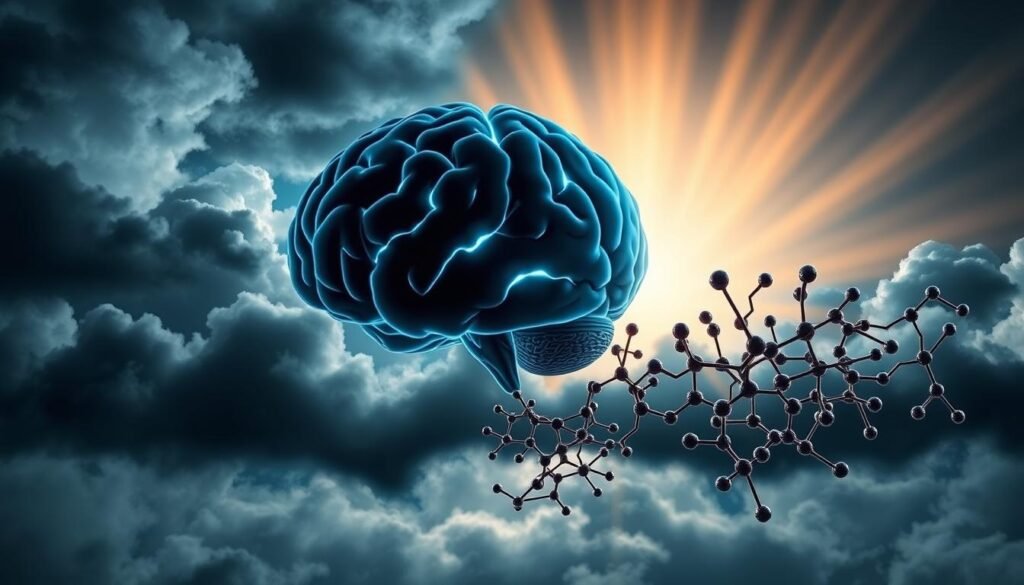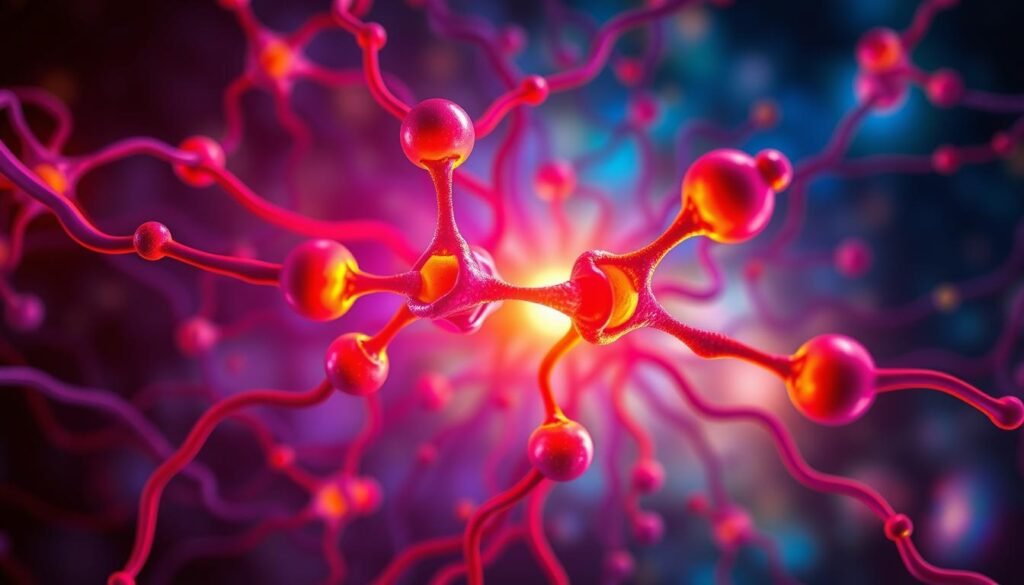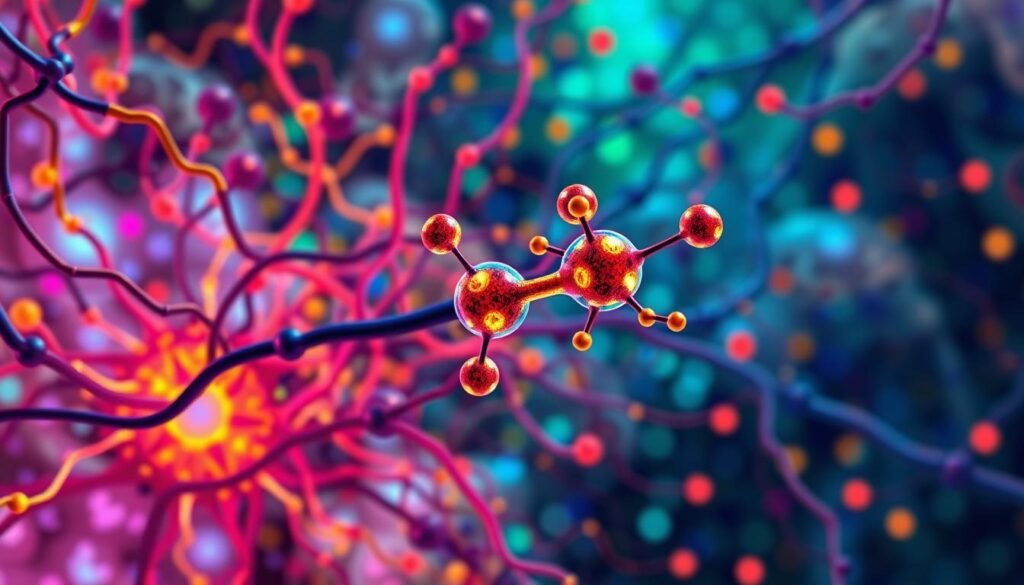It’s a surprise to many that around 90% of the body’s serotonin is in the gut. Only 10% is made in the brain. This shows how important serotonin is in our digestion and in our body’s mental and physical processes. Serotonin helps control our mood and mental health as a key brain chemical.
Eating foods with the amino acid tryptophan is how our body makes serotonin. This fact shows why eating well is key to keeping our serotonin levels right. Low serotonin can make people feel depressed or anxious. Doing regular exercise can also lift serotonin levels, making us feel better. Medicines like SSRIs work on serotonin to improve mental health, showing how vital understanding serotonin is.
Key Takeaways
- About 90% of serotonin is produced in the gastrointestinal tract.
- Serotonin synthesis relies on the essential amino acid tryptophan.
- Low serotonin levels are linked to mood disorders like depression and anxiety.
- Regular aerobic exercise can help increase serotonin levels.
- SSRIs and other medications target serotonin to treat various mental health issues.
Introduction to Serotonin
Serotonin plays many important roles in our bodies. It acts as a chemical messenger, sending signals between nerve cells. Most of it is in our digestive system, where it helps with digestion.
Knowing how serotonin works is key to understanding our health better. It touches on many areas of our well-being.
What is Serotonin?
Serotonin is a key neurotransmitter for our biological functions. It’s known for affecting our mood and feelings of happiness. Serotonin comes from tryptophan, a necessary amino acid.
Though it’s mainly made in the brain, it’s also found in other parts of the body. Serotonin receptors are everywhere, showing its big role in our bodies. This includes how our nerves work.
The Role of Serotonin in the Body
Serotonin does more than just help control our moods. It’s crucial for heart health, digestion, and our sleep patterns. It also affects our eating habits, how aggressive we feel, and our memory.
Research has found 15 different serotonin receptors, each affecting us in various ways. These receptors help manage anxiety, underlining serotonin’s role in mental health. Changes in serotonin levels can influence our health, from what we eat to how energetic we feel.
The Synthesis of Serotonin
Our body makes serotonin through a few key steps starting with tryptophan. This amino acid is vital for health and happiness. Knowing how our body creates serotonin helps us understand its role in our mental and physical functions.
How Serotonin is Produced
The journey to make serotonin begins with tryptophan. It first turns into 5-hydroxy-L-tryptophan (5-HTP). Then, it becomes serotonin through decarboxylation. The enzyme tryptophan hydroxylase plays a big part in this transformation. Factors like tetrahydrobiopterin and vitamin B6 help this enzyme work better.
Essential Amino Acids and Serotonin Production
Eating foods high in tryptophan like turkey and salmon boosts serotonin creation. What we eat greatly impacts how much serotonin we have. Things like diet and gene differences affect our serotonin and how we feel. To learn more about how serotonin affects our mood and behavior, check here.
| Food Source | Tryptophan Content (mg per 100g) | Other Nutrients |
|---|---|---|
| Turkey | 365 | Protein, Vitamins B6, B3 |
| Salmon | 305 | Omega-3 Fatty Acids, Protein |
| Chicken | 335 | Protein, Vitamins B6, B3 |
| Eggs | 150 | Protein, Vitamins B12, D |
| Nuts (e.g., Almonds) | 200 | Healthy Fats, Magnesium |
Mechanism of Action and Effects on Serotonin
Serotonin plays a key role in how we feel and act. It involves serotonin receptors, the release of serotonin, and its reuptake. These elements are vital for serotonin’s influence on our mood and behavior. They are also crucial for the success of antidepressants.
Serotonin Receptors and Their Functions
Serotonin receptors are found all over the brain. They range from 5-HT1 to 5-HT7. These receptors affect our mood, thinking, and anxiety levels. When serotonin binds to these receptors, it can change how we feel and think.
Serotonin Release and Reuptake
Serotonin is released into spaces between neurons, affecting how they talk to each other. For serotonin levels to stay balanced, it must be reabsorbed. This reabsorption is done by the serotonin transporter (SERT). TRINTELLIX, for example, boosts serotonin activity by blocking its reuptake. This action helps improve mood and treat Major Depressive Disorder (MDD). However, patients should be aware of possible risks, like serotonin syndrome. For more on SSRIs, visit this Mayo Clinic page.
| Component | Description | Significance |
|---|---|---|
| Serotonin Receptors | G-protein coupled receptors that mediate serotonin effects. | Influence mood and emotional regulation. |
| Serotonin Release | Process of serotonin being expelled into the synapse. | Essential for effective neuronal communication. |
| Serotonin Reuptake | The reabsorption of serotonin via SERT. | Maintains balance of serotonin levels in the brain. |
Functions of Serotonin Throughout the Body
Serotonin impacts many body functions, from mood control to digestion. It is crucial for our overall health. It plays a big part in the central nervous system and the digestive system. Here, we’ll dive into serotonin’s roles in the body.
Central Nervous System Functions
Serotonin is vital for the central nervous system. It is known as the “feel-good hormone”. It helps regulate our moods. By working on certain brain receptors, serotonin affects how we react to things around us. This is key in battling depression and anxiety.
Drugs like SSRIs increase serotonin in the brain. This helps make people feel better emotionally.
Effects on Digestion and Appetite
About 90% of serotonin is made in the gut. It helps control bowel movements and overall gut health. It also plays a part in how much we feel like eating. Low serotonin levels can cause problems like IBS. This shows how serotonin and gut health are linked.
Impact on Sleep and Mood Regulation
Serotonin is crucial for good sleep. It turns into melatonin, which controls our sleep patterns. Having enough serotonin means better sleep. This leads to more stable moods when we’re awake.
If serotonin levels are off, it can cause mood issues, insomnia, or other sleep problems. Keeping serotonin balanced is important for both our minds and bodies.
Serotonin and Psychotropic Drugs
To treat mood disorders, doctors often use drugs that affect serotonin in the brain. Medicines like SSRIs, SNRIs, and TCAs are common. Each type works in a special way to increase serotonin and norepinephrine. This helps people with depression and anxiety feel better.
Selective Serotonin Reuptake Inhibitors (SSRIs)
SSRIs are a first-choice treatment for depression. Examples like fluoxetine and citalopram increase serotonin levels. This can make people’s mood better and lower anxiety. While most find SSRIs easy to handle, some might face issues like nausea, trouble sleeping, or sexual problems.
Serotonin Norepinephrine Reuptake Inhibitors (SNRIs)
SNRIs like venlafaxine and duloxetine work on serotonin and norepinephrine. Compared to other antidepressants, their side effects are often less harsh. They help with depression, anxiety, and chronic pain. Yet, some may feel dizzy, have a dry mouth, or see their blood pressure go up, especially with venlafaxine.
Impact of Tricyclic Antidepressants (TCAs)
TCAs are less used today because they have more side effects. They increase serotonin and norepinephrine levels in the brain. While they are effective, their downsides like weight gain, feeling sleepy, or heart issues can be too much for some.
Pathophysiology of Serotonin
Understanding how serotonin levels work can help explain different mental health issues. Both low and high serotonin levels have big effects on our mental and physical health.
Low Serotonin Levels and Associated Disorders
Low serotonin is linked to mental health problems like depression and anxiety. These impact feelings and thoughts greatly. In the U.S., antidepressant use almost doubled from 1999 to 2010, jumping from 6% to 10.4%.
This shows more people are treating low serotonin levels.
High Serotonin Levels and Serotonin Syndrome
Too much serotonin can cause serotonin syndrome, which is very dangerous. Symptoms include increased reflexes, restlessness, and unstable vital signs. This can happen to anyone after changing or starting a serotonergic medicine dose.
Over 54,410 cases of exposure to SSRIs were reported in 2016. Sadly, many serotonin syndrome cases involve just one drug.

Serotonin syndrome can also cause blood clotting and kidney failure issues. Many cases might not be reported fully. Serotonin works through complicated systems in our bodies. It’s important to keep serotonin levels balanced to avoid problems.
| Condition | Associated Disorders | Evidence of Impact |
|---|---|---|
| Low Serotonin Levels | Major Depressive Disorder, Anxiety Disorders | 8% increase in deaths related to SSRIs from 2002 to 2016 |
| Serotonin Syndrome | Potentially life-threatening condition | Moderate serotonin syndrome occurs in 15% of SSRI poisonings |
Regulation of Serotonin Levels
It’s key to know how serotonin levels are controlled for mental and overall health. Diet, lifestyle, and supplements are important in serotonin regulation. By looking at these areas, people can boost their serotonin. This raises their mood and behavior.
Diet and Lifestyle Factors Affecting Serotonin
Eating certain foods helps produce serotonin in the body. Foods like cheese, nuts, and turkey are rich in tryptophan, which helps make serotonin. Tryptophan, with the help of vitamin B6, is a stepping stone to serotonin. A balanced diet not only gives nutrients for serotonin but also helps with mood.
Regular exercise boosts serotonin, too. Aerobic activities, like running for 30 minutes most days, are great. Also, getting sunlight improves vitamin D levels. This helps with serotonin.
Supplements and Serotonin Enhancement
Supplements are big in regulating serotonin levels. Tryptophan supplements add to serotonin by providing more precursors. Probiotics support gut health, which is tied to serotonin levels since a lot is made in the gut.
SAMe and St. John’s Wort also help balance serotonin in the brain. They can be part of a plan to better serotonin levels, mood, and mental health.
Pharmacodynamics of Serotonin
Serotonin affects our body’s systems, especially the brain. It plays a key role in how we feel and act. By looking into how serotonin works, we can learn about its effects on mood, behavior, and bodily functions.
Mechanisms of Serotonin Interaction in Brain Chemistry
Serotonin impacts brain chemistry significantly. It interacts with various receptors in the body. While most serotonin is in the gut, it greatly affects the brain too. These interactions lead to changes in mood, how we handle pain, and how we think.
Neurochemical Pathways Involved in Serotonin Function
In the gut, serotonin has different effects. It works through specific receptors. Drugs targeting these receptors help treat gut issues. Serotonin’s reuptake is controlled by the serotonin transporter (SERT). This influences brain chemistry. SSRIs block serotonin reuptake, raising its levels in the brain, which may enhance mood and ease depression.
| Serotonin Receptor | Function | Therapeutic Target |
|---|---|---|
| 5-HT1A | Anxiety and depression regulation | SSRIs, SNRIs |
| 5-HT3 | Control of nausea and vomiting | Antagonists like Ondansetron |
| 5-HT4 | Enhancement of gut motility | Prokinetic agents |
| 5-HT7 | Cognition and mood modulation | Novel antidepressants |

Serotonin’s pathways show its critical role in our wellbeing. It is vital for both mind and body, keeping our neurophysiological balance.
Clinical Significance of Serotonin
Serotonin is key in our mental health, affecting disorders like depression and anxiety. Its role in treatments for these issues is crucial. Grasping how serotonin works can make mental health therapies more effective.
Role in Mental Health Disorders
Serotonin is a target in treating mental illnesses like major depressive disorder and OCD. This neurotransmitter helps control mood and behavior. Low serotonin levels are linked to depression and anxiety, so treatments aim to increase serotonin to reduce these symptoms.
Considerations for Treatment Options
Choosing the right treatment involves many factors. Medicines, such as SSRIs and SNRIs, focus on serotonin. SSRIs increase serotonin levels, while SNRIs affect serotonin and norepinephrine. A good treatment plan also includes therapy and lifestyle changes, for a well-rounded approach.
Healthcare professionals need to watch for side effects and how well treatments work for each person. Discoveries about serotonin’s role in therapy are leading to better ways to handle mental health issues.
| Medication Type | Mechanism of Action | Targeted Mental Health Conditions |
|---|---|---|
| SSRIs | Block serotonin reuptake | Depression, Anxiety Disorders |
| SNRIs | Inhibit reuptake of serotonin and norepinephrine | Depression, Generalized Anxiety Disorder |
| TCAs | Inhibit multiple neurotransmitter receptors | Depression, Chronic Pain |
| MAOIs | Decrease degradation of serotonin | Depression, Anxiety Disorders |
Research on Serotonin
Research into serotonin has made great strides, unveiling new insights into how it impacts our health. Studies have shown its key roles in brain development, how we feel, and digestion. This could mean changes in how we treat various health issues.
Current Findings in Serotonin Studies
There are 17 studies covering a lot about serotonin, especially regarding depression. A big study with 1,002 people found no clear link between serotonin and depression. Another study, with 1,869 people, also didn’t find a direct link. But, it suggested that low serotonin might relate to using antidepressants.
Some research looked into serotonin at brain cell connectors in depressed people, finding maybe more serotonin in the gaps. But a big tryptophan study with 566 people showed it didn’t much affect mood. Also, huge genetics research with over 115,000 people didn’t link serotonin to depression.
Implications for Future Treatments
These discoveries could change how we treat depression, especially with antidepressants. Antidepressants might lower serotonin over time. Treating depression, which is pretty common worldwide, calls for new methods.
Combining drugs that adjust serotonin with talk therapy seems to work well. With these drugs being key for mood problems, finding new ways to adjust serotonin is crucial. This effort seeks to improve treatment for mood disorders based on what we’re learning about serotonin.

Case Studies and Clinical Applications
Serotonin-related treatments have shown good results in clinical studies. These treatments improve depression and anxiety disorders. By managing serotonin levels, patient outcomes get better in mental health.
Examples of Serotonin-related Treatments
SSRIs are often used first for depression and anxiety. Drugs like fluoxetine and sertraline are effective. Many patients feel better in mood and less anxious with these medicines.
SNRIs, like venlafaxine, also help with anxiety symptoms. They are important in treating specific anxiety-related symptoms.
Impact of Serotonin on Patient Outcomes
Watching how patients do with serotonin treatments shows clear trends. People taking SSRIs usually see less anxiety and depression fast. They do better in day-to-day life, enjoying more social interaction and being more productive at work.
| Treatment Type | Common Medications | Clinical Benefits | Associated Conditions |
|---|---|---|---|
| SSRIs | Fluoxetine, Citalopram, Sertraline | Improved mood, reduced anxiety | Depression, Generalized Anxiety Disorder |
| SNRIs | Venlafaxine, Duloxetine | Reduced symptoms of anxiety and depression | Major Depressive Disorder, Panic Disorder |
| TCAs | Amitriptyline | Broader profile for mood enhancement | Chronic pain, Depression |
| MAOIs | Phenelzine | Effective for treatment-resistant depression | Severe depression, Anxiety disorders |
Cases show how vital serotonin is for mood and anxiety. This data helps us see how patients react and leads to new treatments.
Conclusion
Serotonin has a huge impact on our health and mood. It controls our mood, hunger, sleep, thinking, and how we get along with others. Interestingly, most of our serotonin comes from our gut, not just our brain.
This shows how wide its effects are, including the differences in how men and women make serotonin. This is key to treating mental health issues.
A lack of serotonin can make people more likely to have mental health problems. These include depression and thoughts of suicide. Lots of people face these issues in their lifetime. We need ongoing research to fully understand serotonin. This helps in making treatments better, as current options like SSRIs don’t work for everyone.
Personalized medicine, where treatments are tailored to the individual, is becoming crucial. It offers new hope for those who don’t respond to standard treatments.
Serotonin affects more than we thought, including our immune system and general well-being. More research could lead to new ways to treat mental health issues. Serotonin’s crucial role in our bodies promises exciting medical breakthroughs. For more about serotonin and the immune system, check out this study.